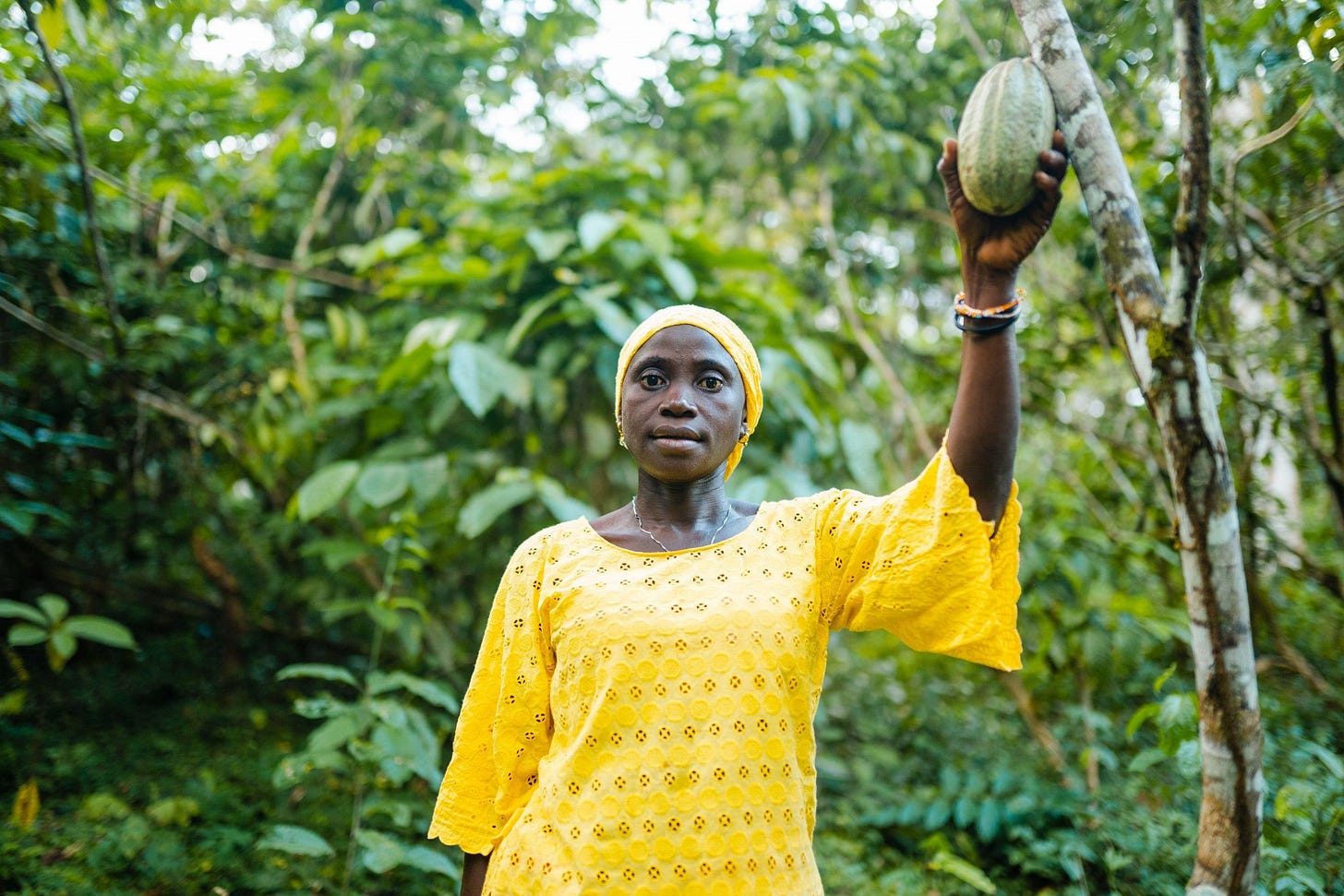🛒 The Check-Out: Divine Chocolate
+ more in our basket - kumquats, climate infographics and subscription laundry pods.
Happy Thursday! Welcome to The Check-Out - your weekly dose of brand x sustainability inspiration, and your discovery box of what the team are loving this week. It’s great to have you here.
Sometimes, we’re scientists. Those times are usually when we’re deciding whether to have one cube of chocolate after dinner, or two (read: a couple of cubes or the whole pack). Luckily (qualified) scientists got there before us - 6 cubes is ok. The other time we’re scientists is when we’re putting our thinking caps on about planetary health. With these two priorities in mind, Divine Chocolate is our equivalent of the WHO, and we’ll do just about anything they say. Today, we’re chewing on two cool collaborations they’ve created to clean up the chocolate supply chain.
After we’ve taken a look at Divine, we’ll share what the Following the Footprints team has loved and consumed this week. Let’s dig in…
> Brand Spotlight

Collaboration and Chocolate: Divine are daring to do two of our favourite things differently.
Divine Chocolate is the only Fairtrade chocolate company that is co-owned by cocoa farmers. Cool? Buckle in - their story started in 1993 when a group of cocoa farmers from the Kuapa Kokoo Farmer’s Union in Ghana voted to set up their own chocolate bar targeting the mass market. The cocoa industry is worth over US$100 billion dollars per year, however, your average cocoa farmer earns less than $1 per day - they earn just 6% of the value of the final bar.
Fast forward to today - Kuapa Kokoo is the largest Fairtrade cocoa co-operative in the world, and they own 20% of Divine. Members get a share of Divine’s profits, and a say in how the social enterprise is run. We’ve loved them for a long time, but today we’re sharing two things about Divine that have made our hearts flutter recently…
First, a quick lesson - how is chocolate actually made? Step 1 - grow the cocoa, typically on small family farms (2-3 hectares) where other crops like plantain are grown for sustenance. Step 2 - harvest the cocoa, carefully! Step 3 - leave the cocoa for 5-8 days to ferment, and then another 7-12 days to dry. Step 4 - roast the beans between 248-300ºF, crush them to release the ‘nibs’, and then process the cocoa mass into cocoa butter and cocoa powder. Step 5 - make the chocolate!
What’s inspired us about Divine recently? Two projects fuelled by two collaborations. Sit back, grab a snack, and let’s dig in…
Collaboration 1: Divine x Ngoleagorbu Cocoa Farmers’ Union x Cocoa Origins Programme
Working with Ngoleagorbu Cocoa Farmers’ Union (a cooperative in Sierra Leone of ~2000 cocoa farmers) and the Cocoa Origins Programme - Divine are helping create the first ‘Forest-Friendly Cocoa Vision’. What is this? A set of criteria and practices that help premium cocoa co-exist with the local wildlife and landscape. Their vision? For this vision to be replicated in other cocoa supply chains and origins around the world. This isn’t an anomaly, Tony’s are famous for taking a similarly collaborative approach, and quite frankly the more the merrier -
Collaboration 2: Divine x HALBA
Divine has joined forces with HALBA, a Swiss chocolate, snacks and ingredient producer owned by Coop Group, to support the Kuapa Kokoo Farmer’s Union in Ghana. This partnership aims to:
Enhance biodiversity
Increase soil fertility
Support food security
Increase farmer income
As part of this collaboration, Divine will support the Dynamic Agroforestry Project (DAF) and finance seeds for annual crops for 120 farmers. Dynamic agroforestry is a natural farming system that combines trees with crops like yam, maize, cassava, cocoa, and banana - increasing biodiversity, soil fertility, food security and farmer income. Not stopping there - Divine are also educating farmers via the Divine and Kuapa Kokoo Adult Literacy and Numeracy program, with a particular focus on women, farm management and increasing participation of Kuapa Kokoo farmers in decision making.
Whew - we’re not even scratching the surface on everything Divine is doing. If you’re still snacking, chew on their impact report too.

> In Our Basket
🔎 What we loved and consumed this week:
From Katherine in London: Having just moved flats I’ve been reflecting on my subscriptions to update postal codes. This reminded me just how much I love Smol and their products. Their subscription service keeps my laundry routine seamless, delivering their plastic-free packaged pods exactly when I need them. Plus, they're all about ditching single-use plastics, staying vegan and cruelty-free, and keeping chemicals to a minimum.
From Jenny in New York: For much of my life, I didn’t give kumquats the time of day, which was a grave mistake. They’re a perfect fruit: tart enough to brighten any dish but balanced by their sweet, edible skin. I finally found them at a market in Sunset Park and have been eating an obscene number of yuzu-coconut-mango-kumquat chia seed pudding bowls since.
From Rosalin in Manchester: Hannah Ritchie’s new book Not the End of the World which explores how we can be the first generation to build a sustainable planet. Confession - I haven’t read it YET, but I have been a long term user of Our World in Data which Hannah is a deputy editor of and I listened to her discuss the book and media’s role in climate change on the Outrage + Optimism podcast, so I’m confident it’s going to be a favourite.
That’s it for today!
Know a brand we should spotlight next? Let Leone know!
Have links that can make the team learn or laugh? Share them with us, we might just share them in The Check-Out next week.
Hungry for more? You’ll see us on Monday! That’s when we suit up and get serious, digging into a topic that is guaranteed to make you look smart at standup.
Much love,
Team FTF


